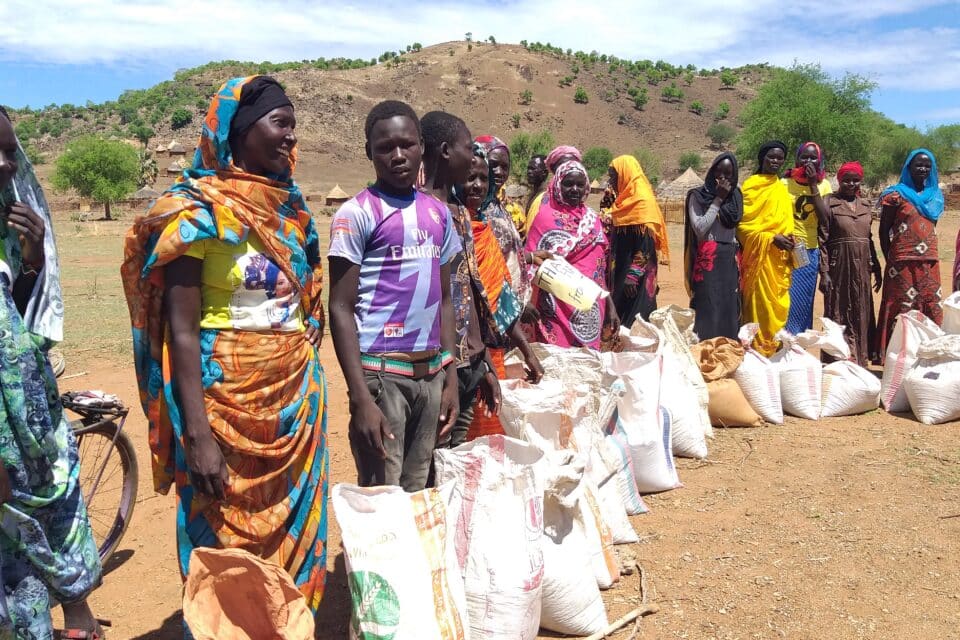Help our local partners realise their vision of hope for their communities

HART’s in-country partner, Benjamin Barnaba, raised the alarm at the beginning of July with credible reports of aerial bombardment in Sudan. He told us that the Sudan Armed Forces launched strikes over the Two Areas – Southern Kordofan and Blue Nile – as part of their plan to “destroy the indigenous people of the land.”
However, aerial bombardment is not the only trial facing the Two Areas. Having received an estimated 29,000 people fleeing conflict in Darfur and Khartoum, humanitarian agencies are “overwhelmed” by the needs of displaced communities. Local people fear that an escalation in violence is “imminent.” However, Benjamin and his team at the New Sudan Council of Churches (NSCC) are not overwhelmed. They have reinforced their humanitarian operations in response to complex needs, providing life-saving assistance, and hope, to thousands.

The need for food, shelter, medical care and clean water has increased in the Two Areas since April. Although “humanitarian and UN agencies are overwhelmed by the huge needs,” the NSCC have risen to the undertaking. They continue to “up-scale the number of [emergency assistance] beneficiaries in order to accommodate families returning to the Nuba Mountains.”
With particular thanks to the Aall Foundation, whose support made it possible for the NSCC to step up their emergency assistance operations in host communities, 1,013 households were reached across Thobo and Umdorein counties. This includes 261 female-headed households (widows), 272 elderly people and 68 people with disabilities. The NSCC deployed 12 trucks to deliver food supplies to remote communities in these counties, and supported a total of 7,091 people – including recently-displaced families – with emergency food assistance.
The situation in the country calls for urgent action by everybody. It is not time to wait or think. It is time to respond… in order to save lives and prevent genocide.
In addition to food assistance, the NSCC provide equipment for midwives to deliver babies safely, transport for education officers to reach displaced communities, and are completing the construction of a hand pump to increase the local people’s access to clean water.

HART’s in-country partners respond to the needs of thousands of people. They save lives in the Two Areas despite mounting insecurity. “Sudan is at a crossroads,” says Benjamin. He reports that the violence is moving towards the mutual destruction of warring groups – the Sudan Armed Forces (SAF) and Rapid Support Forces (RSF) – if peace cannot be brokered.
The people of the Nuba Mountains, Blue Nile and Darfur are tired of war… I lived all my terrible life in the struggle. My children were born during war, they are still in the war and, who knows, they might have their own children in another war… How many more have to die in order to get our freedom?
Benjamin warns that the current conflict has the potential to affect the neighbouring countries of Chad, Libya, South Sudan and the Central African Republic. He also highlights a potential economic impact if the Greater Nile Oil Pipeline is affected and one of the country’s biggest international exports is disrupted. He calls for increased international pressure to be exerted on Russia, China, the United Arab Emirates and Saudi Arabia to use their strong influence in Sudan to ease the fighting.

HART combines aid with advocacy to support our local partners. Two weeks ago, we wrote to Andrew Mitchell MP, the UK’s Minister for Development and Africa, to highlight Benjamin’s alarming reports of aerial bombardment and escalating violence. Click here to read the response.
Our local partners are frequently relied on to manage crises on their own, especially when big agencies like the UN are overwhelmed by the demands on their resources. HART is proud to support the NSCC as they meet the urgent needs of displaced people, amongst mounting violence and insecurity in their own areas of operation. Your assistance enables them to bring hope to their communities.
By Bethany Oliver-Dee, Communications Coordinator